|
|
|
Sort Order |
|
|
|
Items / Page
|
|
|
|
|
|
|
| Srl | Item |
| 1 |
ID:
170375
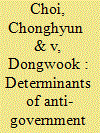

|
|
|
|
|
| Summary/Abstract |
What determines cross-national variations in the extent of anti-government protests in Asia? Anti-government protests have surged across Asia in recent years, with many contributing to consequential political change. However, systematic cross-national comparison of the determinants of protests in Asia is still largely missing. This article fills this important gap by quantitatively examining the explanatory power of the three main theories of contentious politics—grievance, resource mobilization, and political process theories—in the Asian context with new data on anti-government protests in all 25 Asian states from 1990 to 2016. The analysis finds that urbanization, information and communication technology, and regional demonstration effects are the strong catalysts of anti-government protests in Asia, while repressive state capacity particularly dampens protests. The findings offer important insights into the dynamics of the anti-government protests that have become increasingly salient in Asian politics.
|
|
|
|
|
|
|
|
|
|
|
|
|
|
|
|
| 2 |
ID:
170376
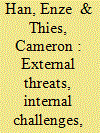

|
|
|
|
|
| Summary/Abstract |
This paper empirically tests bellicist theories of state building in the East Asian context, paying attention to the interplay between external threats and internal challenges and their implications for these states’ extractive power. How much variation in state building in the region can be attributed to war and war preparation as a result of both external threats and internal challenges? In particular, it provides more fine-grained analysis on the different types of internal challenges and their impact on state capacity building. The article argues that in the East Asia region, both external threats and internal challenges are crucial to explaining the variation in state capacity across the region. However, we also find that different types of internal challenges have different effects. Particularly, communist insurgencies seem to have both an immediate and long-term positive effect in compelling the state to respond with more extraction to engage in state-building efforts.
|
|
|
|
|
|
|
|
|
|
|
|
|
|
|
|
| 3 |
ID:
170372


|
|
|
|
|
| Summary/Abstract |
The 2014 Sunflower Movement succeeded in blocking Taiwan's Congress from ratifying the Cross-Strait Services Trade Agreement (CSSTA), a bill that proposed to liberalize trade with China. Since most of the participants in this movement were students and NGO members, they had limited economic and political resources to influence policy change, which makes their success in stopping a trade deal remarkable. Many attribute this important success to an elite alliance with politicians inside the government, fueled by a personal rivalry between political elites. However, I argue that changing public opinion is the more important force behind the creation of the alliance. With original data from interviews with political elites, their staff members, and activists in Taiwan, in addition to secondary information, I confirm public opinion to be the major reason for the political alliance. This case illustrates that in some circumstances, public opinion outweighs the importance of elite rivalry in influencing political elite decision-making, and it could represent a key mechanism of democratic policy-making.
|
|
|
|
|
|
|
|
|
|
|
|
|
|
|
|
| 4 |
ID:
170371
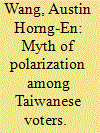

|
|
|
|
|
| Summary/Abstract |
Are Taiwanese voters polarized? By presenting four novel visualizations based on a factor analysis of Taiwan National Security Surveys from 2002 to 2017, this article describes the contours of structural change in Taiwan politics. Overall, the cross-strait position among Taiwanese voters can be described by a stable inverted U shape over time. This arises from the fact that most nonpartisans—typically neglected in the literature on polarization—are moderate. Before 2008, increasing polarization among partisans can be attributed to pan-green voters moving toward independence. Between 2008 and 2014, decreasing polarization stems from moderates self-identifying as pan-blue supporters. Since 2014, a record-breaking number of nonpartisans have left the pan-blue camp, and more extreme pan-blue voters have contributed to a return of polarization among partisans. The results yield important implications for the study of polarization and populism, as well as for the future of Taiwanese politics.
|
|
|
|
|
|
|
|
|
|
|
|
|
|
|
|
| 5 |
ID:
170377


|
|
|
|
|
| Summary/Abstract |
What effect do natural disasters have on political participation? Some argue that natural disasters decrease political participation because of the way they reduce individual and group resources. Others argue that they stimulate political participation by creating new social norms. Previous studies have been limited both by their focus on a specific disaster type and a lack of regional variation. This article advances the literature by assessing the effect of the 2011 triple disaster in Japan on political participation at both the individual and district level. Drawing on multiple sources of data, I use a difference-in-differences identification strategy to show that the 2011 triple disaster in Japan resulted in a 6 percent increase in participation in political groups in regions heavily affected by the disaster, and a 2.5 percent increase in voter turnout in districts in prefectures that were significantly affected by the disaster. The results also show that the effect at the individual level is largely confined to individuals with large social networks, suggesting that the effect of natural disasters on political participation is a combination of their direct and indirect impact on variables that operate through different subpopulations. Directions for future studies are suggested.
|
|
|
|
|
|
|
|
|
|
|
|
|
|
|
|
| 6 |
ID:
170374


|
|
|
| 7 |
ID:
170378
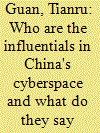

|
|
|
|
|
| Summary/Abstract |
This research note explores an increasingly prominent, but often neglected, communication group in China's cyberspace—the online “influential” (big Vs or verified users)—who shape public perceptions, including on foreign policy issues. Examining threads on Sino-Japanese relations on Weibo reveals a diverse ecosystem that includes not only established media agencies and government agencies, but public intellectuals, whose role and presence are quite central. An analysis of the content of posts finds that influentials have similarly diverse viewpoints on Sino-Japanese relations; some have broken with the conflict-focused discourses that have prevailed on Weibo, reflecting a competing narrative espousing the need for greater pragmatism towards Japan. The findings call into question the argument that social media necessarily trends toward greater nationalism.
|
|
|
|
|
|
|
|
|
|
|
|
|
|
|
|
| 8 |
ID:
170373
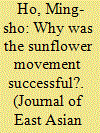

|
|
|
|
|
|
|
|